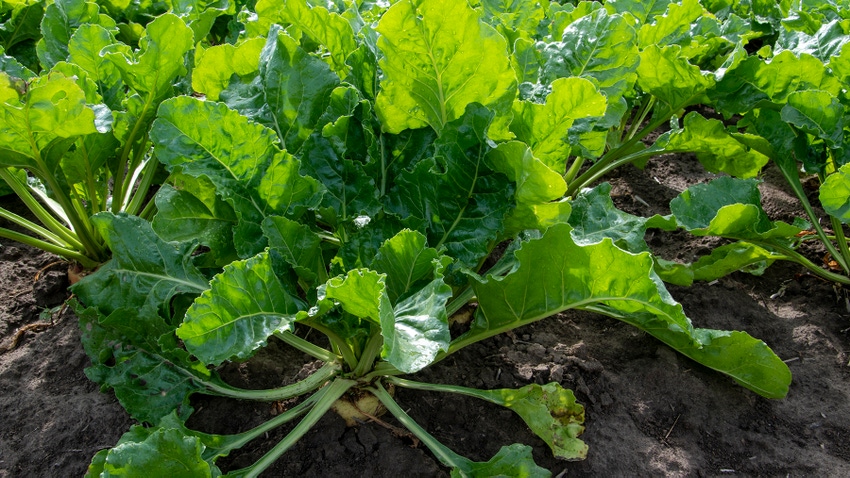
Sugarcane and sugarbeet production are highly specialized processes with a unique set of production costs. These crops are grown in limited geographical regions of the country with sugarcane being grown in Florida, Louisiana, and Texas and with sugarbeets being mainly cultivated in the Red River Valley, upper Midwest, Great Plains, Northwest, and in California.
Sugarcane is a perennial crop often grown in cycles of between four to six years. Conversely, sugarbeets are often grown in rotation with grain, oilseed, and pulse crops, which typically limits the planting of sugarbeets to once every four years for a particular piece of land.
Given that the commodity program safety net for sugarcane and sugarbeet growers is mainly provided through the marketing loan program, this article evaluates sugarcane and sugarbeet production costs relative to loan rates established in the 2018 Farm Bill.
Specifically, production costs of Louisiana sugarcane and that of sugarbeets grown in Minnesota and North Dakota are compared for the last several years, subject to available data.
Cost per acre
In this analysis, Louisiana sugarcane production costs represent the weighted costs per acre for a five-year crop rotation with harvest through stubble, as defined by the LSU AgCenter. Cost data for sugarbeets was obtained from the University of Minnesota FINBIN database which encompasses production and cost data for many sugarbeet-producing farms in Minnesota and North Dakota (the Red River Valley).
Since 2018, production costs for sugarcane in Louisiana have risen substantially. The main drivers behind these increases have been mainly due to a 130% increase in the cost of fertilizer and an 82% increase in the cost of diesel fuel since 2018 (Figure 1).
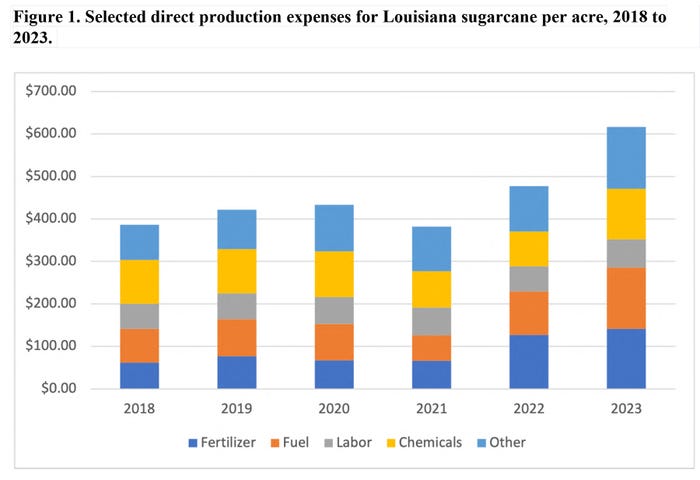
For Louisiana sugarcane producers, the total cost of production has risen from $551 to $858 per acre over the period of 2018-2023. That is an increase of over $307 per acre since 2018.
A unique feature of sugarcane’s cost structure is the acquisition and maintenance of highly specialized farm equipment (e.g., combine billet harvester, planting wagons). Increases in machinery costs coupled with higher interest rates have resulted in overall machinery ownership costs increasing by 55% over the past five years (Figure 2).
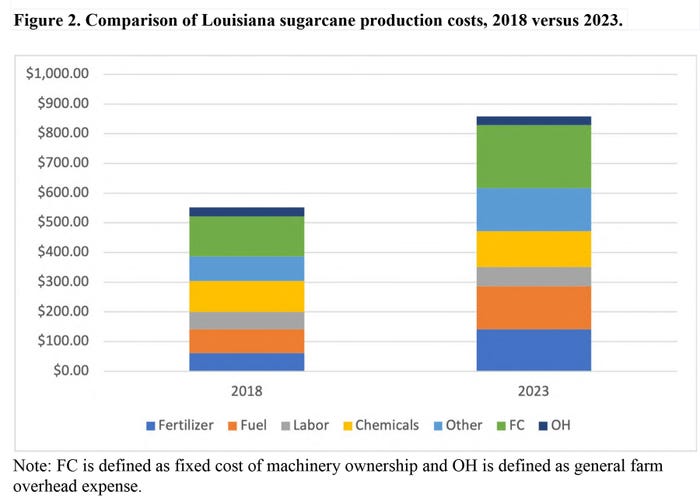
As a result of the increase in production costs, the average breakeven selling price for raw sugar has increased from 17.2 cents per pound in 2018 to 28.2 cents per pound in 2023, an increase of 64% (or 11 cents) as noted in Table 1.

Sugar processing
Referencing the uniqueness of the crop, sugarcane must first be processed into raw sugar and then transferred to another facility where it is converted to refined sugar.
Sugarbeets omits this intermediate step because after it undergoes initial processing, the finished product is refined sugar. Because of this difference in processing techniques, the production costs for sugarcane are calculated per pound of raw sugar while the cost of sugarbeets are calculated on a per-ton basis.
While produced on a slightly larger area than sugarcane, the cost structure for sugarbeets can differ from that of sugarcane based on geographical differences.
In the Red River Valley region, the average total cost of production per acre for sugarbeets has increased from $1,099 in 2018 to $1,350 in 2022, an increase of $250 per acre. Large drivers of the increase in production costs were chiefly attributable to a 66% increase in the price of fertilizer and a 37% increase in the price of diesel fuel (Figures 3 and 4).
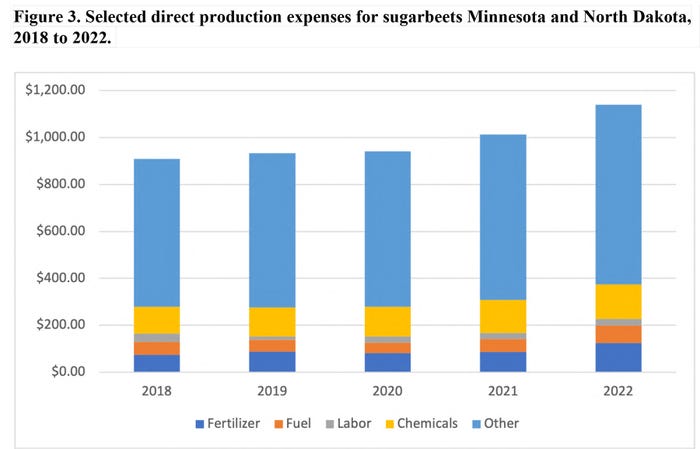
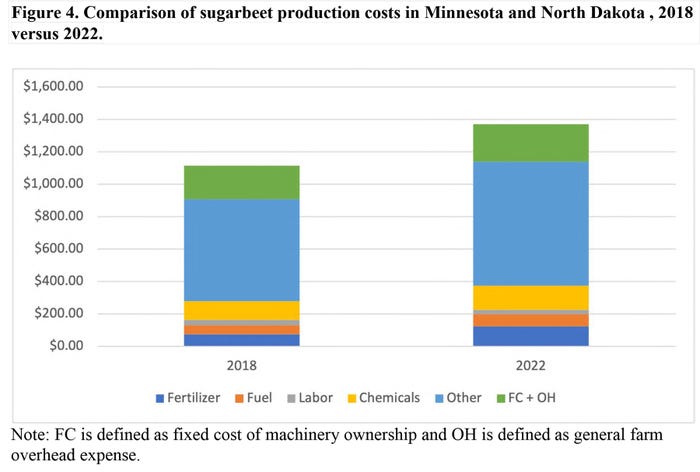
Like sugarcane, sugarbeets have their own set of unique costs (e.g., specialized equipment costs for carts, defoliators, and harvesters), which is reflected in the cost increase over the observed period.
Sugarbeet producers have seen their cost-per-ton estimates increase substantially from the 2018 crop year. The average direct cost per ton of sugarbeets produced has increased from $31.73 in 2018 to $42.19 per ton in 2022. However, the highest cost occurred in 2019, when the average cost of production per ton was $48.21.
When comparing the lowest cost of production per ton ($31.73) to the highest ($48.21), this represents an increase of over $16 per ton (52%). Likewise, the total cost plus overhead per ton has increased from $40.07 to $60.25, an increase of greater than $20 per ton (Table 2).

Disrupted planting
The increase in production cost per ton in the 2019 crop year was caused by flooding that disrupted planting followed by a freeze during the harvesting of sugarbeets. This disruption reduced3.50.1- sugarbeet yields causing production costs-per-ton to sharply increase. Since that time, sugarbeet costs have displayed precipitous peaks and valleys.
The 2018 Farm Bill sets the raw cane sugar loan rate at 19.75 cents per pound and the refined beet sugar loan rate at 25.38 cents per pound (USDA, 2023).
This article provides information that could be useful in Farm Bill discussions regarding sugarbeet and sugarcane loan rates.
Since the enactment of the 2018 Farm Bill, costs of production for sugar have drastically increased—by about 30% for sugarbeets (2018-2022) and by about 38% for sugarcane (2019-2023).
Source: Southern Ag Today, a collaboration of economists from 13 Southern universities.
About the Author(s)
You May Also Like








